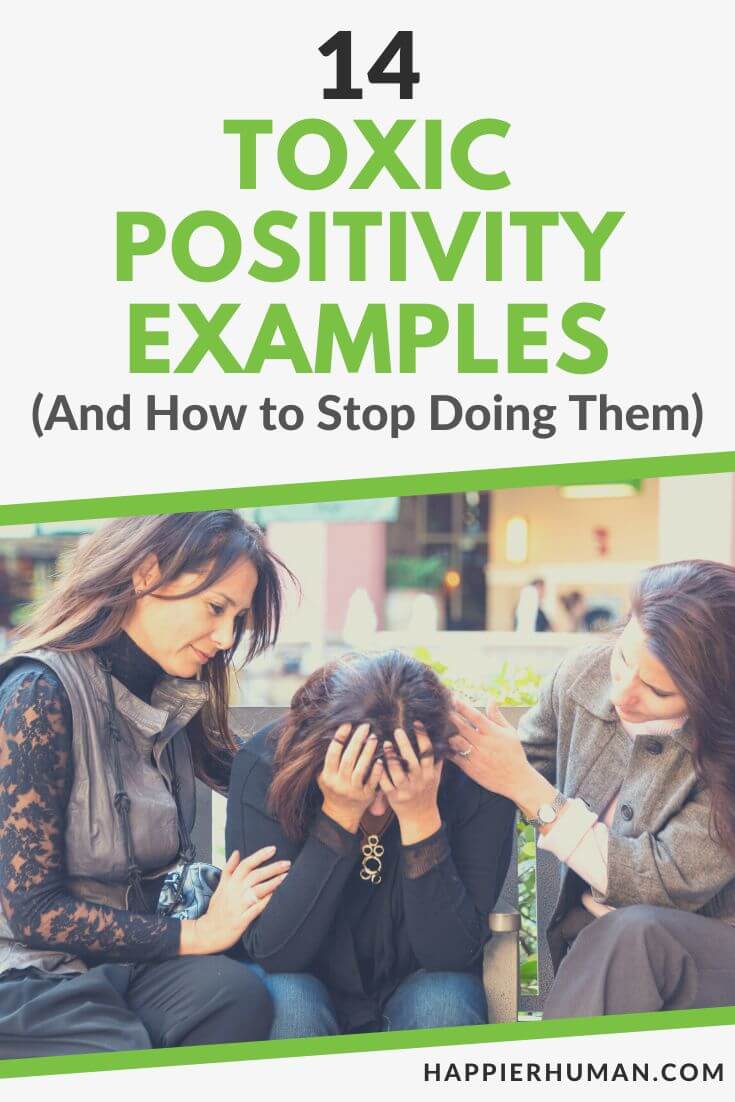Have you ever been around someone who seemed to have an inappropriate amount of enthusiasm or optimism, even in the face of difficult circumstances?
I can recall confronting someone who I know was the victim of verbal abuse. I let her know that I had overheard the conversation and wanted to make sure she was okay.
She responded to me with a smile and made the verbal abuser the butt of her joke. I was surprised by her reaction and didn’t know how to respond.
At that moment, I classified her as being in denial. Now I would say it was also toxic positivity.
Plus, I can't forget the number of times I have heard a drug addict being referred to as “lots of fun” or “knowing how to have a good time”.
What is Toxic Positivity?
Toxic positivity is the excessive and inappropriate promotion of positive thinking and happy emotions, in situations where such feelings would be misplaced or harmful. It often takes the form of empty platitudes or forced cheerfulness and can be damaging to both individuals and groups.
Signs You May Be Suffering from Toxic Positivity
There are a few signs to look out for when it comes to figuring out whether you suffer from toxic positivity.
Constant Brave or Poker Face
You may find that you are always putting on a brave face, no matter what is happening in your life. You may feel like you have to pretend to be happy all the time, even when you are feeling anything but happiness.
It's ok to properly mourn a loved one or express the fact you are having a bad day.
A Silver Lining
Another sign of toxic positivity is that you are always trying to find the silver lining in every situation, no matter how dark or difficult the situation may be. Sorry, but some situations are simply tragic and there is no silver lining to be found.
You Only See the Good in People
Do you find that you only see the good in people, even when they have done something bad? You may give people the benefit of the doubt, even when they don’t deserve it and have clearly hurt someone.
You Ignore Your Feelings
Toxic positivity can also manifest itself in the form of ignoring your feelings. You may bottle up your emotions and pretend like everything is okay, even when it’s not.
You Dismiss Other People’s Feelings
Not only do you ignore your own feelings, but you may also dismiss the feelings of others. You may think that their feelings are not valid or that they are just being negative.
You Are Always Optimistic
You may find that you are always optimistic, no matter what the situation is. You may feel like you have to be positive all the time, even when it’s not warranted.

These signs of toxic positivity are something to take note of, but it’s important to remember that not everyone who displays these signs is suffering from toxic positivity.
It’s also important to remember that toxic positivity is not the same thing as being positive. It’s possible to be positive without being toxic.
The Harmful Effects of Toxic Positivity
Toxic positivity can have harmful effects on both individuals and groups.
On an individual level, toxic positivity can lead to feelings of inadequacy and worthlessness. When you are constantly being told to be positive, you may start to feel like you are not good enough if you’re not happy all the time.
Toxic positivity can also lead to burnout. When you are constantly putting on a brave face and pretending to be happy, it can take a toll on your mental and emotional health.
On a group level, toxic positivity can create an environment where people are afraid to express their true feelings. When people are constantly being told to be positive, they may start to feel like their negative emotions are not valid. It is healthy to not be happy or in agreement all the time.
Negative emotions are not automatically bad, especially in the wake of harmful behavior.
Toxic positivity can also lead to groupthink. When people are constantly being told to think positive, they may start to ignore evidence that contradicts their positive view of the world. This can lead to dangerous and harmful decision-making.
14 Toxic Positivity Examples and How to Stop Doing Them
1. Telling Someone “Everything Happens for a Reason”
This is one of the most cliche and annoying things you can tell someone that just had something negative happen to them. It's the equivalent of saying “It could be worse” or “At least you're not dead.” It makes you sound indifferent to their pain and like you're trying to find a silver lining that doesn't exist.
Instead of telling them everything happens for a reason, try saying “I'm sorry that happened” or “That sounds really tough.”
2. Saying “Just Be Positive!”
When someone is feeling down, the last thing they want to hear is to “just be positive.” It's not that simple. Being positive all the time is unrealistic and unhealthy.
It's okay to feel sad, angry, or frustrated. Telling someone to “just be positive” is invalidating their feelings and telling them that they're wrong for feeling the way they do.
Instead, try telling them “There are better days ahead” or “this too shall pass”. You can also encourage them to acknowledge these feelings, but not let them take over.
3. Pretending Everything is Fine
Pretending everything is fine when it's not is one of the most harmful things you can do. It's called ” burying your head in the sand” and it only makes things worse.
If you're going through a tough time, it's important to reach out for help. Don't try to go through it alone. And don't pretend that everything is okay when it's not.
4. Laughing When Someone Else is Hurting
It's natural to want to make light of a situation when someone else is hurting. But laughing when someone else is in pain is not only insensitive, it's cruel.
While nervous laughter can occur when someone is not comfortable, it is different from actually laughing as if what the other person is going through is funny. An example may be if your friend falls and you laugh instead of rushing to help them.
5. One-Upping Someone's Sad Story
One-upping someone's sad story is when you try to make your own problems seem worse than theirs. While you may think you are trying to get them to “see the bright side” or be “grateful for what they have,” you're actually just coming across as narcissistic.
Let the other person speak and focus on commenting on what they are saying. Then maybe you can give an antidote about a related experience.
6. “You Should Be Grateful for What You Have”
Yes, gratitude is important. However, if someone just lost their child, they may not want to hear how they should be grateful for having another one. Even if someone lives in a nice house, losing a job can put them at risk for becoming homeless. So, a newly unemployed person may not want to hear how they should be grateful for their roof over their heads.
When someone is grieving, the last thing they want to hear is how they should be grateful. This sounds harsh and can make it sound as if the deceased person did not matter.
Instead, try and help them focus on the positives in their life and let them know you’re there for whatever they need.
7. Only Posting Ideal Photos on Social Media
So many people use social media to make their lives look perfect. But the reality is that no one's life is perfect.
By only posting ideal photos on social media, you're giving people the impression that your life is perfect. This can make people feel bad about their own lives and compare themselves to you in an unhealthy way. Matter of fact, social media has been linked to teen suicide and depression.
You may also fall into this slippery slope of trying to live up to a false ideal you curated online – almost like how Marilyn Monroe's persona eclipsed the real Norma Jean.

There is nothing wrong with posting beautiful and happy photos. However, if you find yourself over-relying on filters and editing, it may be time to take a break. Otherwise, people may only see the “funhouse” version of you.
8. Constantly Saying “I'm So Busy”
You may think that constantly saying you're busy makes you sound important and in demand. But in reality, it makes you sound self-important and like you don't have time for anyone else. It may also come across as you assuming that others are not as busy as you.
It's okay to be busy. But try not to make it the center of your life. And when someone asks how you are, try to give a more balanced answer instead of just saying you're busy.
9. Complimenting People Who Are Clearly Hurting
While it's important to build people up, sometimes people just want to be heard. So instead of complimenting someone who is clearly hurting, try listening to them and validate their feelings.
An example of this would be if your friend is going through a tough break-up and you say, “You're better off without them.” This may be true, but it invalidates their feelings and makes them feel like they are not allowed to be sad and mourn this unexpected loss of love.
10. Saying “Let Me Know If You Need Anything”
When someone is going through a tough time, they may not want to burden you with their problems. Instead of saying, “Let me know if you need anything,” try offering specific help.
For instance, you could say, “I'm going to the grocery store, do you need anything?” or “I'm free on Wednesday, would you like to get coffee?” This way, the person knows that you are actually available and willing to help them as opposed to just saying an empty phrase to sound nice.
11. Saying “What Doesn't Kill You Only Makes You Stronger”
I have heard this phrase more times than I can count. Sadly, this is not necessarily true. Sure, some people can persevere through anything. However, some situations result in trauma that can last a lifetime.
Countless military veterans physically survived the dangers of war only to come home and commit suicide.
This phrase makes light on how events can shape a person's life forever in ways others can't see. It also downplays the severity of what someone is going through. The person may not be stronger but bitter, hurt, sad, angry, traumatized, etc.
In reality, it's okay to be vulnerable and to need help.
12. Telling Someone to Smile
This may be more gender-based as many women ( including myself) have had experiences in which a random stranger (often male) told them to “smile“. This is not only intrusive but can also be seen as telling someone to change their emotions to please you.
While the stranger may think they are being friendly and trying to bring joy, the woman may feel uncomfortable or threatened. She may have had a terrible day, found out about an illness, just broke up with someone, lost a loved one, etc., and does not need forced positivity she is not feeling at the moment.
13. Making Someone Else's Job Sound Easier Than Yours
You may think you are complimenting someone's job by saying it appears fun and easy. Sorry, but such related remarks are back-handed insults even if you are trying to come across as self-deprecating.

Many years ago, when I did temp admin work, I remember snide remarks like ” It must be so nice being a secretary, your job is so easy compared to mine!”. The best way to approach this is to not comment on a job you have never done at a company. You may insult the wrong person without knowing it.
14. Over Complimenting Someone for Losing Weight
“Wow, you look good – you lost weight!”, may seem like a compliment – but you may be telling the person:
While it is always nice to receive compliments, be careful of congratulating someone for losing weight. The person may have an eating disorder or hiding a serious illness. Plus, we live in a very weight-conscious society where it is easy to tie one's self-esteem to your dress size.
Instead, try mentioning something else such as their outfit, hair, etc. Or you can simply say, “You look nice/beautiful/good”, without bringing weight up. Of course, if they bring up the weight topic, then it's okay.
Final Thoughts About Toxic Positivity
While it is great to have a positive outlook on life, be careful of falling into the trap of toxic positivity. This way of thinking can be harmful to both you and the people around you. If you find yourself engaging in any of the above behaviors, try using the specific strategies I mentioned to stop doing them.
Remember, it's okay to have negative emotions and to need help from others. We all go through tough times in life – no one is immune. Lean on your friends and family during these difficult periods and be there for them when they need you to.
If you want to know more about how to handle toxic situations, check out the article 66 Toxic Relationship Quotes to Free Yourself Today. It’s a real eye opener!


